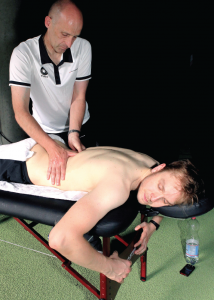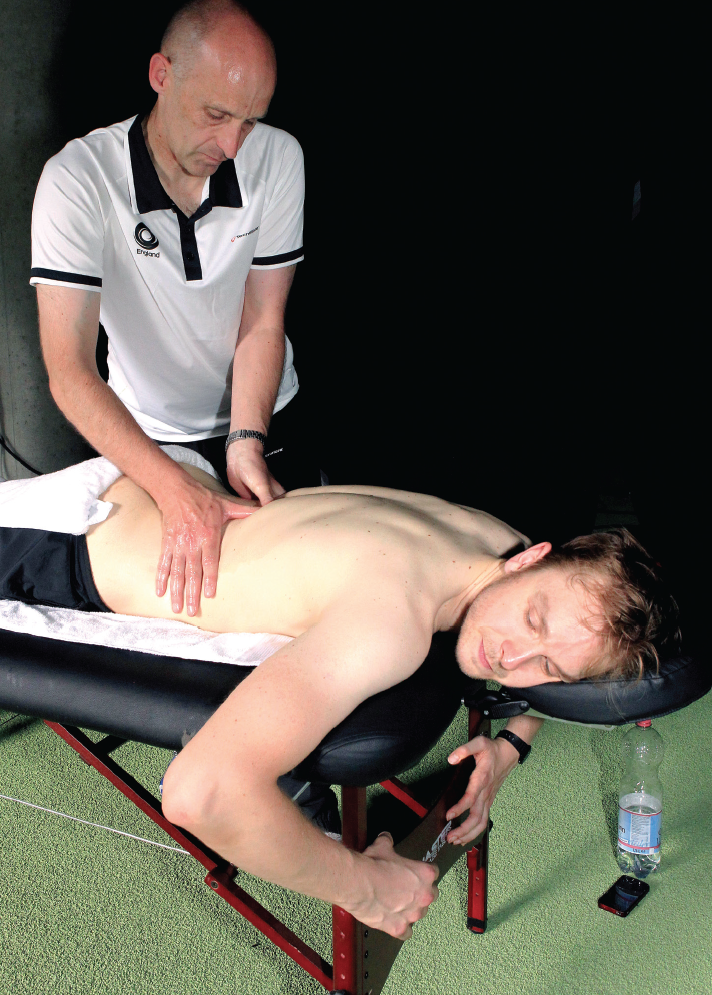
By Damon Leedale-Brown, Sports Scientist & Conditioning Specialist
During the competitive season we all have the desire to produce our best squash every time we step on court. This is obviously not easy to achieve and is influenced by many factors including our ability to maintain fitness and body health through a potentially long and physically arduous squash season.
In the US, the intensity and frequency of competition really ramps up as we move into the New Year. Collegiate teams are playing most of their key league matches in this period, and they are looking toward Team Nationals in mid-February. The top junior players involved in school squash have regional and national championship events, around which they are also playing Gold and JCT events building up to Individual Nationals in March. Many adult players are involved in team leagues with matches every week, and tournament players have the major goal of US Masters Championships in March on the horizon.
Not surprisingly this is the time of year that I typically see more players picking up injuries and coming down with illness. The success of a college coach’s season may come down to whether or not they are able to field their top-9 players; a high school team’s first shot at a National title may suddenly be thrown to the wind with last minute injuries and illness. Consider the adult player who has worked for months toward the US Masters Championships only to see it all wiped away with an acute injury sustained that one time they did not warm up properly before a match. Add to this all the chronic injuries we tend to see in the second half of the season which are the culmination of gradual deteriorations in body health.
It would be nice to think that we could take steps to completely avoid illness and prevent injury but, unfortunately, we cannot fully control this. However, there are many proactive steps that we as players (and coaches) can take to significantly reduce the risk of injury and illness. So let’s look at some of the areas we can generally control:
Nutrition
Don’t expect to perform at consistently high levels, physically and mentally, in training and matches if the quality of fuel you are putting into the body is poor! Equally, you have a better chance of warding of illness if you have a well balanced nutritious diet. Focus on natural/ unrefined foods with plenty of fruits and vegetables and good protein choices (fish, grilled chicken, etc). Try and avoid convenience foods (fast food/fried food, etc.) and packaged/canned foods which are typically high in sodium. Keep drinking regularly throughout the day to help maintain hydration and by far your best option here is water! I still find it amazing that the drink of choice at junior events for many players is the well-marketed ‘sports drink’ that is nothing more than sugar and chemical colorings. Personally I would stay well away from drinks that look like they will glow in the dark!
Rest & Sleep
It is well documented in research that following hard training and match play the regeneration of our physiological systems takes place during rest and sleep. Start cutting down on sleep and periods of rest, and it is no surprise that the body starts to break down. Rather than feeling fitter and stronger from all that hard training, you start to feel constantly tired, mentally fatigued and struggling to find the motivation to train. I would encourage every player to have at least one full rest/recovery day each week, and simply increasing the average time you sleep each night by an hour or two could make a huge difference to your overall mental and physical health, and the progressions you are then able to make in training. For a more detailed and interesting insight into this area of sleep read ‘Sleep Thieves’ by Stanley Coren (www.amazon.com/Sleep-Thieves-Stanley-Coren/dp/068483184-8).
Balance your training
If all we do to train for our sport is play the sport then typically what starts to develop alongside improvements in court fitness & physiology are reductions in our overall musculoskeletal body health. It is not uncommon to see a player break down physically at a point where they feel they are reaching a high level of court fitness and performance—especially demoralizing for a player when this comes just before the event they had been focusing on all season. In season it is clearly important to spend time on court but, alongside this, extra attention needs to be paid to maintaining body health particularly around the areas of mobility and strength. Look at your typical week and consider the balance of training—Is every session on court with the ball? Is every session hard? Do you have a rest day? Consider introducing variety into your training week with options such as Yoga, Strength & Mobility Circuits, Interval Bike sessions, etc.
Plan your season
Much as we would like to believe that we can perform at our best every time we step on court, this is unrealistic. If you have specific tournament goals during the season culminating in an end of season championship, then try planning your training to best support your ability to perform well in these events. Simply forging ahead with the same unstructured training approach week after week is not typically a great recipe for success. Try and set training goals for each period of time between events and make sure to focus your training around these short term targets.
Manage & Maximize time
Most Junior and College players have a heavy academic program (mid-term exams) during the busy period of their squash season, and adult players have work and family commitments around which they have to fit in squash. A more focused approach to your training makes it easier to maximize your training time and helps get the most out of every single session whether on or off court. Don’t get caught up with the ‘more is better’ mentality—my experience working with players across all levels (including top ranked World Tour players) is that shorter, high intensity sessions will, in most cases, give you a better return on court—and result in a lower incidence of chronic injury, illness and over-training. It takes more discipline and focus to do these sessions well but the rewards are worth it!
Warm Up
A structured and well thought through warm up can go a long way toward reducing the risk of injury when leading into a challenging training session or match. I run squad training sessions with highly ranked National Junior players most weekends during the season. For the older age group players (U19 & U17) our sessions are 2 hours in duration and we will spend at least 20 minutes at the start of each session working through a focused movement and mobility-based warm up program. This helps the players prepare physically and mentally for the challenging and dynamic movement-based strength, speed and agility circuits we lead into.
Soft tissue work
Soft Tissue or Myofascial release work has become a much more common term within sports performance and athletic training. Essentially it refers to pressure applied to soft tissue to help deform it and, in turn, help release areas described by therapists as ‘trigger points’, ‘knots’, or ‘areas of increased muscle density’. Players are becoming more accustomed to using specific equipment designed for this purpose such as foam rollers and massage sticks. In my racket bag I always carry a Trigger Point roller called the Grid (www.tptherapy.com/shop/smrt-core-products/the-grid.html), and The Stick (www.thestick.com). In addition I would encourage players (if they can afford it) to find a reputable sports massage/manual therapist who can help with those deep and more difficult to release areas—often very painful and can be sore the following day! I spend significant time each week on court and definitely have found that if I see a manual therapist every 1 -2 weeks it really helps me stay on top of body health.
Dealing with injury or illness at any point in the squash season is never easy for any player. Hopefully the advice provided above will help you go a long way toward maintaining both on-court fitness and overall health through a tough squash season, and put you in a good position to perform at your best when it really matters to you.





